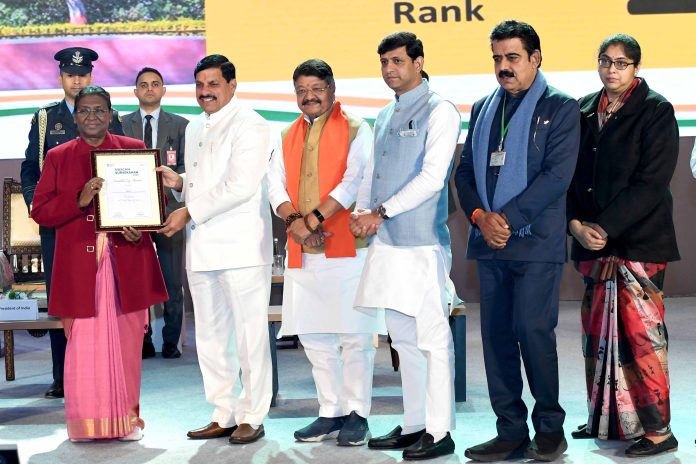Indore, Jan 11: Indore secured the top position among the ‘cleanest cities’ of India for the seventh consecutive time on Thursday, with civic officials saying the city’s effective, sustainable and durable waste management system played a big role in this success.
This time, Indore, also known as Madhya Pradesh’s industrial capital, shared the top position with Gujarat’s Surat city in the central government’s annual cleanliness survey for 2023.
The survey, based on the theme ‘Waste to Wealth’, saw a tough competition among more than 4,400 cities in different categories.
President Droupadi Murmu gave away the awards to the winners at an event held in New Delhi.
The survey carried a total of 9,500 marks.
MP’s Indore city secured 4,709.40 marks out of 4,830 under ‘Service Level Progress’ for segregated collection, processing and disposal of different types of waste, Indore Municipal Corporation’s (IMC) consultant for the Swachh Bharat Abhiyan, Amit Dubey, said.
“A sustainable system of garbage collection, processing and disposal has been developed in Indore. The city’s consecutive success in the National Cleanliness Survey is based on this strong foundation,” he said.
With a complete ban on single-use plastic in Indore, waste generation has reduced here over a period of time, Dubey said.
The ‘3 R’ (reduce, reuse and recycle) centres, cloth bags and utensil ‘banks’, parks developed using reusable things out of waste materials and home composting units have also helped in the reduction of waste in the city, he said.
The waste from 4.65 lakh households and 70,543 commercial establishments is systematically sorted at the primary source and processed and disposed of at different plants in the city, IMC officials said.
Nearly 692 tonnes of wet waste, 683 tonnes of dry waste and 179 tonnes of plastic waste are collected every day in the city under different categories, they said.
For this, around 850 specially-designed vehicles are run across the city having different compartments for bio-waste items like diapers and sanitary napkins. The waste from households in the city is collected after segregation under six categories at the doorsteps.
A ‘Gobar-Dhan’ plant is being run by a company under public-private partnership (PPP) on 15 acres of land at Devguradiya trenching ground in the city.
It has the capacity to produce 17,000 to 18,000 kg of bio-CNG and 100 tonnes of organic fertilisers by processing 550 tonnes of wet waste (like fruits, vegetables and raw meat waste) every day, officials said.
The bio-CNG produced at this plant is used to run 110 city buses, with the fuel being sold to the municipal corporation for Rs 5 per kilogram less than the prevailing market rate, they said. (Agencies)
Trending Now
E-Paper


